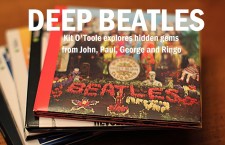As the Beatles finished their rocking rendition of “Get Back” at the conclusion of their 1969 Apple rooftop concert, John Lennon joked “I would like to say thank you on behalf of the group and ourselves and I hope we’ve passed the audition.” While unbelievable today, there was one time when the Beatles did not pass the audition: January 1, 1962.
That day, the Beatles recorded their demo for London’s Decca Records. A very nervous Lennon, Paul McCartney, George Harrison, and then-drummer Pete Best tore through selections from their live shows (mainly eclectic covers) as well as a few Lennon/McCartney originals (“Like Dreamers Do,” “Hello Little Girl,” and “Love of the Loved”). Head of A&R Dick Rowe famously rejected the group, stating that “guitar groups are on the way out.” Luckily, manager Brian Epstein ignored the advice and later secured a deal with EMI. The oft-bootlegged Decca session, however, showcases the Beatles at their earliest, as they were transforming from a rough Hamburg-trained rock act to a professional group. This month, Deep Beatles takes another look at these audition tapes, beginning with their cover of Buddy Holly’s “Crying, Waiting, Hoping.”
In 1961, Epstein was busily shopping around his new clients to various London labels with no luck. Their fortunes seemed to change on December 13, 1961, when Decca A&R rep Mike Smith attended one of the Beatles’ Cavern Club shows. Smith then approached the band to record an audition tape, and they set a date: December 31, 1961. Road manager and assistant Neil Aspinall agreed to drive the group to the West Hampstead Studios; unfortunately a snowstorm, along with Aspinall getting lost, made the trip last over 10 hours. They all arrived at 10 p.m. (Epstein had already arrived, as he had traveled by train), so the recording session was rescheduled for the following day.
The next day found the nerve-wracked Beatles at Decca studios, on time. Smith arrived late, having partied late the night before; to further make the situation difficult, he insisted that the group use Decca’s amplifiers instead of their own. In just about an hour, the Beatles (at this point still called “The Silver Beatles”) recorded 15 songs, all selected by Epstein. With Decca producer and ex-Shadows drummer Tony Meehan behind the control board, the group tore through numerous songs they had performed in their club shows, including “Crying, Waiting, Hoping.”
Their appreciation of the Holly track should come as no surprise — the rocker was an early influence on the group’s playing style, and his distinctive chord changes and lyrics created a model for the budding songwriters. Numerous Merseybeat groups covered the track, and the Beatles were no different. Harrison assumes the lead vocal here, slightly mimicking Holly’s vocal tics, and faithfully reproduces original guitarist Donald Amone’s solo. The song’s merits are clear: the call-and-response motif, the uptempo rhythm, and simple but memorable chorus would draw positive responses from crowds. Remarkably poised, Harrison croons the first lines: “Crying, waiting, hoping, you’ll come back; I just can’t seem to get you off my mind.” During the bridge, the group demonstrates their tight harmonies, particularly on the “do do do” backing vocals.
One question remains: How was Best as a drummer? Debate still rages whether Best deserved the negative criticism from future producer Martin. On “Crying, Waiting, Hoping,” Best had to execute a somewhat complex drum pattern, and does so adequately. However, he lacked Ringo Starr’s pounding, bass-heavy technique, which became a crucial factor in early hits like “I Want to Hold Your Hand.” That unique style injected youthful energy into the track, accelerating the excitement already present in their teenage fans. Best was not a terrible drummer, but Starr possessed a flair needed to distinguish the Beatles from other so-called “beat groups” of the time.
The rest is history: Decca rejected the Beatles, instead choosing competing band Brian Poole and the Tremoloes. While that act scored a hit with their cover of the Contours’ “Do You Love Me” in 1963, they never matched the Beatles’ creativity or popularity. Meanwhile, Epstein finally persuaded EMI to give them a chance, Martin liked what he heard, and Starr soon joined the band. Interestingly the Beatles revisited the song in 1963, when they performed the song for BBC radio.
While the Decca sessions may not present the Beatles at their best, they hint at the originality and enthusiasm that would soon propel their career.
Deep Beatles will examine another Decca track in the next edition.
- The Rescued Early Paul McCartney Song That Completed ‘Beatles For Sale’ - December 4, 2024
- A Rare Beatles Cover Proves John Lennon Was Wrong About His Voice - November 26, 2024
- How John Lennon Came Roaring Back on the Beatles’ White Album - November 22, 2023



George’s guitar solo is better than the original, and the call and response and harmonies give texture to the song. Holly’s vocal, however, is recorded with a lot more punch. Funny that the Tremeloes were also a guitar group.
Yes, I’ve always particularly liked the Beatles rendition of this song. The guitar work is lovely and the song is pure and perfect. It seems to me that Buddy Holly and Carl Perkins songs fit beautifully among early Beatle songs. Like the Beatles, they have a very similar purity in their song writing, no gimmicks, just stunning chord structures and harmonies.